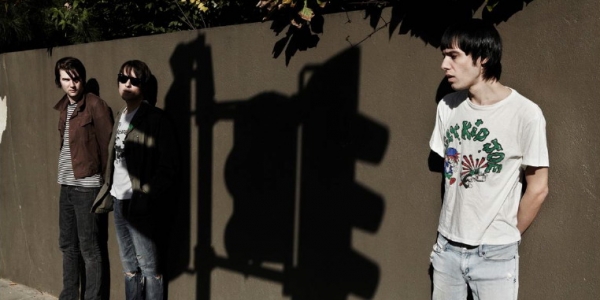Jarman is in a retrospective mood as he picks up the phone minutes after a sweaty gig in Leicester, England. “I was looking back at old photographs the other day and realised that we’ve been going for ten years now,” he explains. “It’s just crazy. We never thought that all this would happen when we were starting out. The whole thing is still pretty surreal to be honest.”
Dubbed the “biggest cult band in the UK” by Q Magazine, The Cribs have accrued a notoriously loyal and passionate fan base over the years with their charming brand of garage indie. And Jarman says that even now, five albums on, the band still operates on a shoestring, writing and recording in the same way they did when the two twins Gary and Ryan Jarman, and younger brother Ross Jarman formed in late 2001.
“We still seem to rehearse in our bedrooms and the garage as we always have. Not too much has changed really, we still pretty much listen to the same stuff and have the same mentality to making music. I’m proud of that,” he says.
However, he says that in the early days, there was a danger of the band being chewed up by an industry that was relentlessly intent on moulding the ‘next big thing’.
“We’re at a point now where a lot of the bands that were around when we were first came out are gone now. A lot of them took shortcuts to certain things, and now those bands don’t exist anymore.
“A lot of trends come and go in the UK, and there’s a lot of hype and build-up, but we always tried to keep away from all that. The UK scene is so small hat it’s quite difficult for some bands to not get swallowed up by that.”
Although it was a testing time for the boys, Jarman says that it was also eye-opening, to see how the industry operated, and how much the media dominated a band’s exposure. “Certain promotional channels such as radio and TV were so complicit with trying to cohort what supposedly was a ‘hit’ at the time. The media had a really tangible concept of what they wanted, and once that concept was turned into a reality by some bands, it was hard for them to stop wanting it.
“We were told that we weren’t palatable enough for radio – probably because of how the record sounded as it was quite lo-fi. It was crazy. We had a single that was doing very well in the charts, but the radio wouldn’t play it. It would’ve been quite easy at the time to have gone in with a producer like Stephen Street to get it on the radio, but we wouldn’t have been comfortable with that, and looking back, we can see that the decisions we made have served us well over the years,” he says.
The band found itself in a similar position in 2009 when, even after releasing three hugely successful albums, several radio stations turned them away at the door. “I remember when we put out the fourth record in 2009 and our radio plugger told us that the singles weren’t going to be played on the radio because the mainstream channels had decided that guitar music is dead. We’d been working on a record for a while, so it was quite a shocking thing to hear. Luckily though, we weren’t a band that depended on that. But if you were in a band whose bread and butter was radio play, it would be like having a rug pulled from under you. We weren’t particularly deterred, but it was definitely a sign of the times.”
Still, testament to the band’s incredibly loyal following, 2009’s Ignore The Ignorant reached number eight on the UK albums chart, even outselling several Beatles re-issues that were released in the same week. “It was a really empowering feeling to see that it didn’t matter what the agenda was with those channels, as we had managed to operate on our own level,” Jarman recalls.
“It gave us a good boost to see that while other bands were going down the pan, we were experiencing our best period to date. It almost felt like a ‘tortoise and the hare’ moment – others had run out of steam and we had hit our stride.”
Jarman adds that even though it may have only been a phase driven by trends, the early millennium was a good time for bands in the UK, and is now a side of the music industry that has since been lost.
“It’s dead now really. That time has been and passed. The radio just has a couple of token bands and plays them. We get played, but I feel like they only do it because they feel they have no choice because the band became popular. We have had a level of commercial success that people can see and think validates us on some level, so they are almost forced to play us.
“I’m really happy now. The position we have found ourselves in is all I ever aspired to be in really – to be able to operate on our own level and do what we want. If what we make is successful then that’s good, if it doesn’t work out, then that’s also fine. It’s better than being downed by fashion or by trends.”
Now, currently in the midst of a world tour on the back of their fifth album, In The Belly Of The Brazen Bull, Gary says that musically, the band is stronger than ever. “It’s my favourite album. I do tend to say that after each release, but I think you need to feel like that after each album. If you’re going to be touring something for 18 months, you need to have a lot of satisfaction with what you did,” he says.
This album is the group’s first release since parting ways with legendary ex-Smiths and Modest Mouse guitarist Johnny Marr. This was an event which Gary says put The Cribs back under the spotlight. “I think we were open to more critique as we had gone back down to a three-piece,” he says. “Because we had lost a member, people went over it with a much finer tooth comb. But I was very happy with the way the album was received.
“If it was criticised for any reason, it was always for something that I could accept and stand by. That’s always been important to me – I never thought I’d be the cool kid in the class or anything, some people like what you do, and some people don’t, but that’s what you want. It’s better than being the quarterback or the cheerleader in school; you should split people’s opinions.
“If people didn’t like it for certain reasons, those were probably the reasons I did like it. It’s just a difference of opinion. I’m not a self confident person, and I’m not somebody with lots of self esteem or bravado, but I can say that I’m proud of that record.”
Jarman adds that even though the band no longer has the creative input of Marr, his departure has liberated them, and freed them up to make music as they did in the early days. “People forget that we’d been in the band for six or seven years by the time Marr joined, and he was only there for three years. So it really felt like we had just reverted back to normal. At first it was strange, but we just went back to doing what we had always done before. A lot of what we did was based on our personal relationships as brothers, and a lot of our in-jokes. We went back to coming up with musical ideas at home, late at night, and we would go on crazy road trips where we would stay in seedy hotels with a four track and just record.
“So with the last album, a lot of our inspiration came from doing this that stuff because that’s how we have always naturally worked together. After Johnny left we were very frivolous and I think that’s what informed a lot of the early sessions.
“It definitely sweetened him leaving – we had become close and he’s somebody we care about and whose input we valued, but when he was no longer there, we got really spontaneous.”
With no plans for a sixth album as of yet, Gary says that this tour, which finishes up in Australia in January, will close the curtains on the first period of the band’s history.
“After ten years of recording and touring, the Australia gigs are our last ones booked at the moment,” Gary says. “So I’m not exactly sure what the future holds yet; it almost feels like this will be the end of the first chapter.”
BY CALLUM FITZPATRICK

